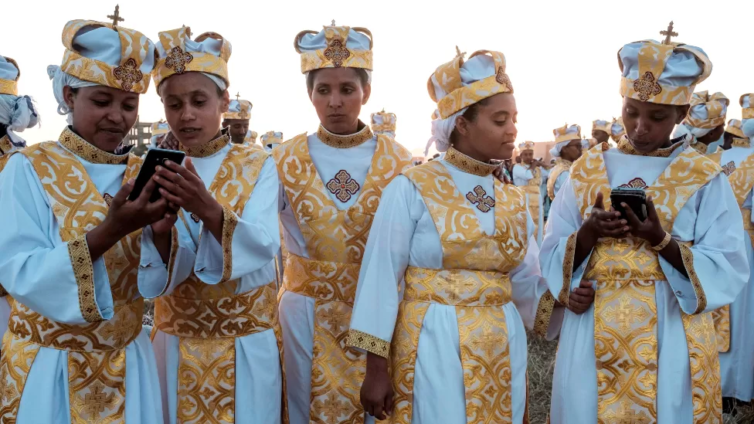
Audio By Carbonatix
Ethiopia has restricted social media and messaging platforms ahead of rival planned rallies following a split in the popular Orthodox Church.
The row has caused deadly violence and began last month when some clerics accused the main church of ethnic discrimination, which it denies.
The authorities banned protests by both sides due to take place on Sunday.
Some supporters of the main church angrily accuse the authorities of backing the breakaway group.
They had vowed online to defy the ban and go ahead with their rally as a show of strength for the Orthodox Church, which is one of the oldest in sub-Saharan Africa and one of the few in the region to exist before the arrival of European missionaries.
There are fears of a complete internet shutdown in the coming days. It is a tactic commonly used in the country - which has a population of 115 million - though rarely in the capital, Addis Ababa.
Some areas of the northern region of Tigray, where a brutal two-year conflict came to an end in November after a peace deal brokered by the African Union (AU), remain without access to the internet.

Netblocks, an organisation that monitors internet access, said the current restrictions are affecting Facebook, Messenger, Telegram and TikTok.
Those with virtual private network (VPN) software can get on to those sites, but a total shutdown would prevent that.
London-based VPN research firm TOP10VPN said demand for VPNs in Ethiopia skyrocketed by 1,430% on Friday.
The authorities have also closed schools on Friday as tension mounts in the deeply religious society - and there are concerns the situation may escalate further.
The authorities are also preparing for the annual AU summit, which is due to be held next week.
It will be the organisation's first meeting since the Tigray deal was signed and the government will be anxious to avoid unrest in Addis Ababa, which is where the AU's headquarters is based.
What is behind the split?
Three archbishops from Oromia, which surrounds Addis Ababa and is the country's most populous region, accused the leadership of the main church of discrimination and a lack of diversity.
They say for too long the Orthodox Church has been dominated culturally by other ethnic groups. Amharic, for example, is the working language of the country, and the patriarch, its influential leader, is an ethnic Tigrayan.
The dissenting clerics said services should be held in the Oromo language - and though the main church says this happens, they say not nearly enough.
The archbishops, who have been excommunicated after setting up a breakaway synod, say they have a great deal of support in Oromia and had organised a counter rally in Addis Ababa.
But in a blow for the dissenters, a court placed an injunction on them on Friday, banning them and the clergy they have recently appointed from entering churches belonging to the Orthodox Church.
The fallout may also have a political element.
Some analysts say the patriarch, Abune Mathias, has not been on good terms with the authorities since speaking out about the war in Tigray, controversially saying that a genocide was being committed there.
Its planned rally was to show off the strength of its support. It was angered after Prime Minister Abiy Ahmed instructed his cabinet ministers to keep out of the matter, feeling the government should take its side.
Following the rally ban and the social media restrictions, it has been announced that Mr Abiy is meeting the patriarch, so tensions may ease over the next few days.
The state-linked Ethiopian Human Rights Commission has also stepped into the fray, releasing a statement on Friday accusing the security forces of using excessive force against followers of the main church.
It refers to extrajudicial killings, beatings, harassment and arbitrary arrests and says eight people were killed during religious clashes last Saturday in Shashamane, a town in Oromia.
Latest Stories
-
Uproar as UG fees skyrocket by over 25% for 2025/2026 academic year
43 minutes -
Japan PM joins fight for more female toilets in parliament
2 hours -
Ga Mantse declares war on fishing industry child labour
2 hours -
Adom FM’s ‘Strictly Highlife’ lights up La Palm with rhythm and nostalgia in unforgettable experience
3 hours -
OMCs slash fuel prices as cedi gains
4 hours -
Around 40 dead in Swiss ski resort bar fire, police say
5 hours -
AFCON 2025: Aubameyang and Nsue make history among oldest goalscorers
6 hours -
AFCON 2025: How Kwesi Appiah’s Sudan qualified for round of 16 without scoring any goal
7 hours -
Ghana is rising again – Mahama declares
7 hours -
Firefighters subdue blaze at Accra’s Tudu, officials warn of busy fire season ahead
8 hours -
Luv FM’s Family Party In The Park ends in grand style at Rattray park
8 hours -
Mahama targets digital schools, universal healthcare, and food self-sufficiency in 2026
8 hours -
Ghana’s global image boosted by our world-acclaimed reset agenda – Mahama
8 hours -
Full text: Mahama’s New Year message to the nation
8 hours -
The foundation is laid; now we accelerate and expand in 2026 – Mahama
8 hours

